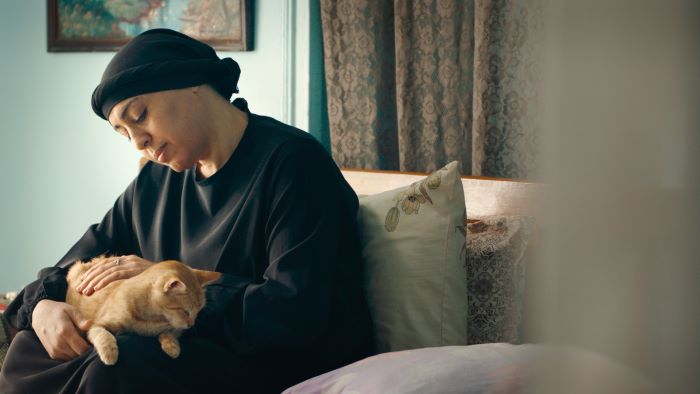![]() Occasionally, a filmmaker shakes up the documentary format. Director Keith Maitland’s Tower (2016) re-created a horrific mass shooting through animation. Robert Greene resorted to a form of therapy by having adults who had been sexually abused reenact their past, not graphically, in Procession (2021). This year, Tunisian director Kaouther Ben Hania cleverly strips off layer after layer of a family history in the engrossing, intimate, and expansive Four Daughters.
Occasionally, a filmmaker shakes up the documentary format. Director Keith Maitland’s Tower (2016) re-created a horrific mass shooting through animation. Robert Greene resorted to a form of therapy by having adults who had been sexually abused reenact their past, not graphically, in Procession (2021). This year, Tunisian director Kaouther Ben Hania cleverly strips off layer after layer of a family history in the engrossing, intimate, and expansive Four Daughters.
Of the 27 films seen at the recent Toronto International Film Festival, Four Daughters offered a refreshing and stimulating surprise, although it did not come out of left field. Ben Hania’s The Man Who Sold His Skin was nominated for the Best International Feature Academy Award, and this, her latest, was well received at Cannes. Of the films in the competition for the 2023 Palme d’Or, I would rank this film at the top, and that’s also considering The Zone of Interest and Anatomy of a Fall.
From the beginning, the director lets you in on the film’s mechanics. In the talking-head interviews, the mother, Olfa Hamrouni, and her two younger daughters, Eya and Tayssir, engage in a freewheeling back-and-forth with Ben Hania, who remains behind the camera. However, Olfa’s eldest daughters are missing. They are described as having been “devoured by a wolf.” Years earlier, they ran off to join ISIS in Libya.
Olfa and her two youngest also step in to direct the actors who have been hired to depict the more disturbing scenes of the family’s history. (Acclaimed Tunisian-Egyptian actress Hend Sabri takes on the role of Olfa in the reenactments. The eldest daughters, Rahma and Ghofrane, are played by Nour Karoui and Ichraq Matour, respectively.) In one sequence, Olfa takes over and gives adjustments to the actors playing out her violent wedding night—she avoided the advances of her bridegroom while still being able to convince her family she had lost her virginity. Olfa admits she slept with her husband once a year, but only if he earned enough money. She rationalizes that she earned that cash, which might strike viewers as odd, considering she reprimands Eya and Tayssir on camera as “a bunch of whores.” Olfa is nothing but a walking matriarch of contradictions.
As a teen, Olfa became a weightlifter to defend her own mother from men. Now, she wields a rigid, punitive outlook when it comes to her daughters, instilling in them the idea that a woman’s body is the property of her future husband. Though she slut shames Eya and Tayssir, she has her own personal moral code: She left her husband and had an affair with Wassam, an escaped convict imprisoned for murder. She even harbored him successfully from the police. He helped the household’s finances by becoming a gigolo sleeping with older women, with Olfa’s approval.
Viewers accompany the actors in rehearsals and the interactions between the real-life figures and their onscreen interpreters. As a result, this is meta-moviemaking with meaning as the actors figure out the psychology of their counterparts and the familial dynamic that led to the radicalization of Olfa’s two eldest.
The family opens up before the director, flaws and all. (Apparently, cussing is important in Tunisian culture.) Olfa participates in the project to put the past behind her—which, as the saga unfolds, may be wishful thinking. No one is camera shy, so much so that when Eya acts out an encounter she had with her mother’s boyfriend, she remains committed and nonplussed about the subject matter, sexual abuse. The actor (Majd Mastoura) portraying Wassam, though, can’t deal with the content and walks off the set, wanting to have a word with Ben Hania.
As the family’s past is exposed, the film becomes more insightful on why Olfa’s four daughters reacted to her behavior. As Stephen Sondheim wrote, children will listen.







Leave A Comment